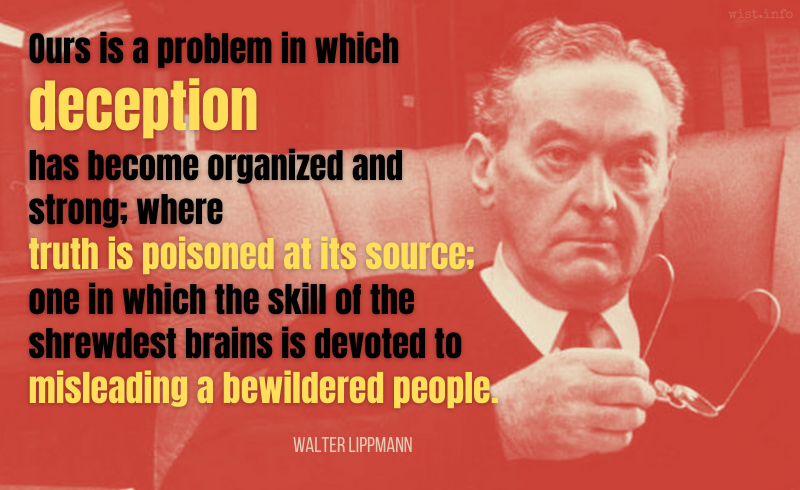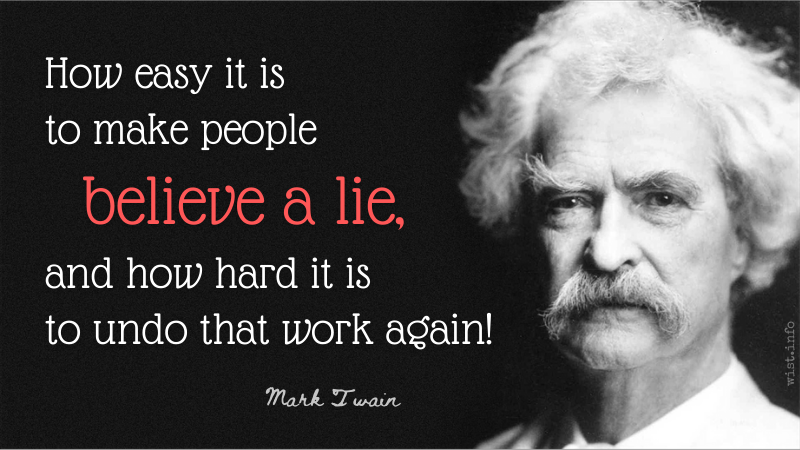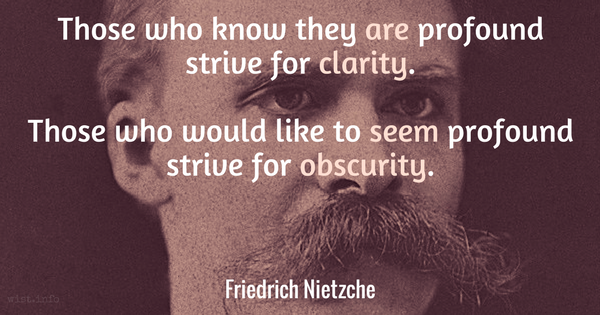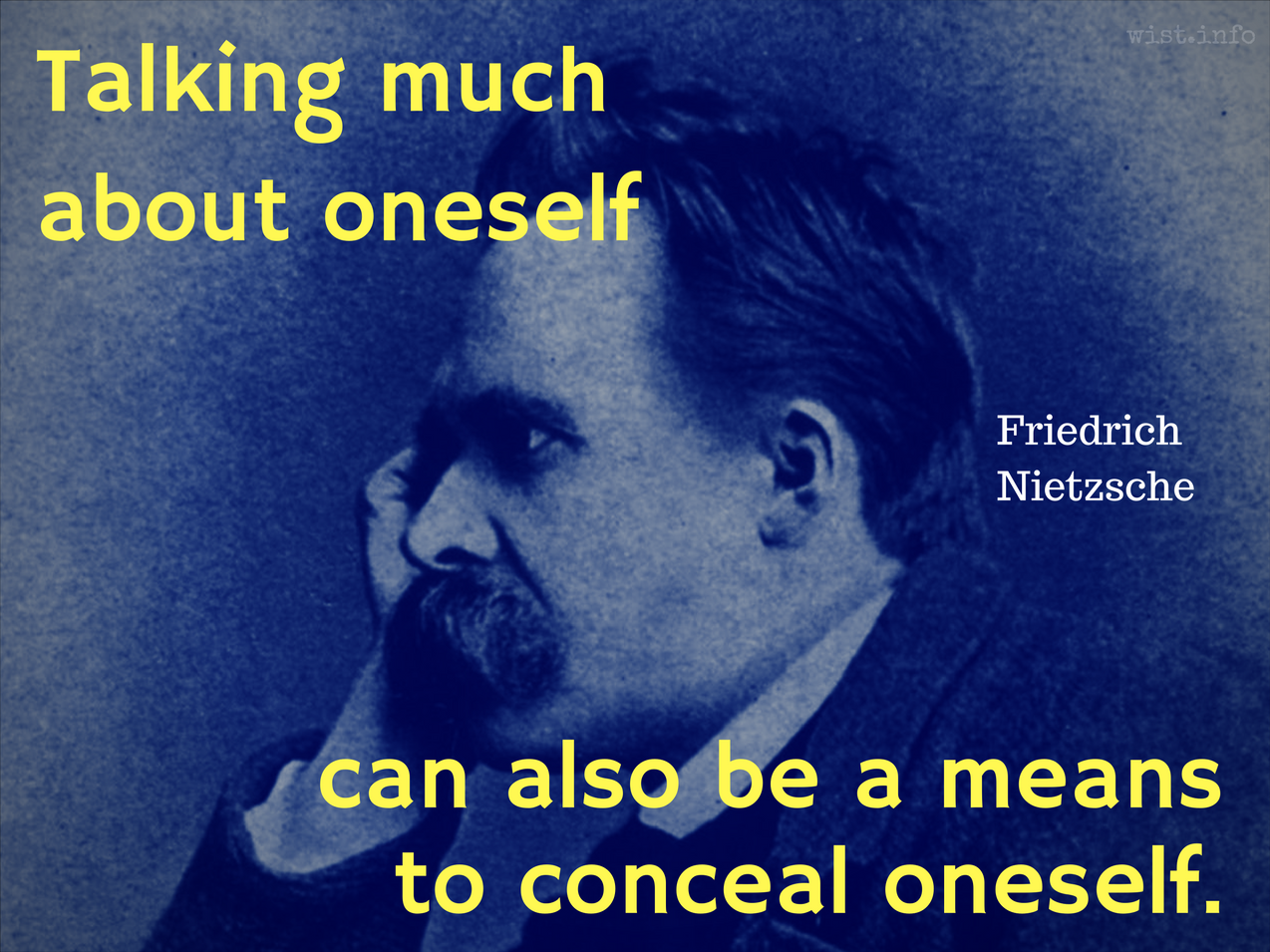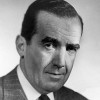BENJY: The kiss. There are all sorts of kisses, lad, from the sticky confection to the kiss of death. Of them all, the kiss of an actress is the most unnerving. How can we tell if she means it or if she’s just practicing?
Ruth Gordon (1896-1985) American actress, screenwriter, playwright
The Leading Lady, Act 2 (1948)
(Source)
Quotations about:
deception
Note not all quotations have been tagged, so Search may find additional quotes on this topic.
My dear brothers, when you hear the progress of enlightenment extolled, never forget that the devil’s cleverest trick is to persuade you that he does not exist!
[Mes chers frères, n’oubliez jamais, quand vous entendrez vanter le progrès des lumières, que la plus belle des ruses du diable est de vous persuader qu’il n’existe pas!]
Charles Baudelaire (1821-1867) French poet, essayist, art critic
Le Spleen de Paris (Petits Poèmes en Prose), No. 29 “The Generous Gambler [Le Joueur généreux]” (1869) [tr. Kaplan (1989)]
(Source)
A warning by a Parisian preacher, as reported by the Devil himself. Used in movie The Usual Suspects (1995) as "The greatest trick the Devil ever pulled was convincing the world he didn't exist."
(Source (French)). Alternate translations:
My dear brethren, never forget, when you hear the progress of wisdom vaunted, that the cleverest ruse of the Devil is to persuade you he does not exist!
[tr. Shipley (<1919) "The Generous Player"]
My dear brethren, never forget, when you hear boasts about the progress of enlightenment, that the finest ruse of the devil is to persuade you that he does not exist!
[tr. Hamburger (1946) "The Generous Gamester"]
My dear brothers, never forget when you hear people boast of our progress in enlightenment, that one of the devil's best ruses is to persuade you that he does not exist!
[tr. Varèse (1970)]
The Devil's subtlest ruse is to convince us that he doesn't exist.
[tr. McGowan (1993)]
Dear brethren, never forget that the finest of all the devil's tricks is to persuade you that he doesn't exist.
[tr. Lerner (2003)]
My dear brethren, do not ever forget, when you hear the progress of lights praised, that the loveliest trick of the Devil is to persuade you that he does not exist!
[Source]
The truth is I’ve never fooled anyone. I’ve let men sometimes fool themselves. Men sometimes didn’t bother to find out who and what I was. Instead they would invent a character for me. I wouldn’t argue with them. They were obviously loving somebody I wasn’t. When they found this out, they would blame me for disillusioning them — and fooling them.
Marilyn Monroe (1926-1962) American actress, sex symbol
My Story, ch. 24 “Another Love Affair Ends” (1974) [with Ben Hecht]
(Source)
The truth may be out there, but lies are inside your head.
No one is ever warmed by wool pulled over their eyes.
Marcelene Cox (1900-1998) American writer, columnist, aphorist
“Ask Any Woman” column, Ladies’ Home Journal (1948-02)
(Source)
No one is ever warmed by wool pulled over their eyes.
Marcelene Cox (1900-1998) American writer, columnist, aphorist
“Ask Any Woman” column, Ladies’ Home Journal (1948-02)
(Source)
It is a melancholy truth that a suppression of the press could not more compleatly deprive the nation of its benefits, than is done by its abandoned prostitution to falsehood. Nothing can now be believed which is seen in a newspaper. Truth itself becomes suspicious by being put into that polluted vehicle. […] I will add that the man who never looks into a newspaper is better informed than he who reads them; inasmuch as he who knows nothing is nearer to truth than he whose mind is filled with falsehoods & errors. He who reads nothing will still learn the great facts, and the details are all false.
Thomas Jefferson (1743-1826) American political philosopher, polymath, statesman, US President (1801-09)
Letter to John Norvell (11 Jun 1807)
(Source)
But of all injustice, theirs is certainly of the deepest die, who make it their business to appear honest men, even whilst they are practising the greatest of villainies.
[Totius autem iniustitiae nulla capitalior quam eorum, qui tum, cum maxime fallunt, id agunt, ut viri boni esse videantur.]
Marcus Tullius Cicero (106-43 BC) Roman orator, statesman, philosopher
De Officiis [On Duties; On Moral Duty; The Offices], Book 1, ch. 13 (1.13) / sec. 41 (44 BC) [tr. Cockman (1699)]
(Source)
(Source (Latin)). Alternate translations:
No act of injustice is more pernicious than theirs, who while they are attempting the greatest deceit, labor to appear good men.
[tr. McCartney (1798)]
But in the whole system of villainy, none is more capital than that of the men, who, when they most deceive, so manage as that they may seem to be virtuous men.
[tr. Edmonds (1865)]
But of all forms of injustice, none is more heinous than that of the men who, while they practise fraud to the utmost of their ability, do it in such a way that they appear to be good men.
[tr. Peabody (1883)]
The most criminal injustice is that of the hypocrite who hides an act of treachery under the cloak of virtue.
[tr. Gardiner (1899)]
No iniquity is more deadly than that of those who, when they are most at fault, so behave as to seem men of integrity.
[ed. Harbottle (1906)]
But of all forms of injustice, none is more flagrant than that of the hypocrite who, at the very moment when he is most false, makes it his business to appear virtuous.
[tr. Miller (1913)]
Taking all forms of injustice into account, none is more deadly than that practiced by people who act as if they are good men when they are being most treacherous.
[tr. Edinger (1974)]
IMOGEN:O,
Dissembling courtesy! How fine this tyrant
Can tickle where she wounds!William Shakespeare (1564-1616) English dramatist and poet
Cymbeline, Act 1, sc. 1, l. 97ff (1.1.97-99) (1611)
(Source)
Only Truth can give true reputation: only reality can be of real profit. One deceit needs many others and so the whole house is built in the air and must soon come to the ground.
[Sola la verdad puede dar reputación verdadera, y la substancia entra en provecho. Un embeleco ha menester otros muchos, y así toda la fábrica es quimera, y como se funda en el aire es preciso venir a tierra.]Baltasar Gracián y Morales (1601-1658) Spanish Jesuit priest, writer, philosopher
The Art of Worldly Wisdom [Oráculo Manual y Arte de Prudencia], § 175 (1647) [tr. Jacobs (1892)]
(Source)
(Source (Spanish)). Alternate translations:
Nothing but truth can give a true Reputation; and nothing but substance turns to account. One cheat stands in need of a great many others, and by consequent, the whole building is but imaginary: and seeing it is founded in the air, it must of necessity fall to the ground.
[Flesher ed. (1685)]
Only truth can bestow a true reputation, and only solid character prove profitable; one fraud makes necessary another and more; and so the whole of what is built up is flimsy, and as it rests upon air, it is destined to return to earth.
[tr. Fischer (1937)]
Only the truth can give you a true reputation, and only substance is profitable. One act of deceit begets many others, and soon the whole ghastly construction, which is founded in the air, comes tumbling down.
[tr. Maurer (1992)]
Ours is a problem in which deception has become organized and strong; where truth is poisoned at its source; one in which the skill of the shrewdest brains is devoted to misleading a bewildered people.
Walter Lippmann (1889-1974) American journalist and author
A Preface to Politics, ch. 4 (1913)
(Source)
Unlike a human smile, purring cannot be, as far as anyone knows, faked.
Jeffrey Moussaieff Masson (b. 1941) American author
The Nine Emotional Lives of Cats, ch. 3 (2002)
(Source)
Truth is the first casualty in war.
Aeschylus (525-456 BC) Greek dramatist (Æschylus)
(Misattributed)
Variant: "Truth is the first casualty of war."
Not found, as such, in Aeschylus' works. The closest (Fragm. Incert, xi.) is his phrase "God is not averse to deceit in a just cause." Attribution to of the subject phrase to Aeschylus dates only back to 1965. The first recorded use of the phrase as such is from 1915, but even there it is offered as a quotation from an unnamed source.
More discussion of the history of this phrase can be found here and here.
Who dares think one thing, and another tell,
My heart detests him as the gates of hell.[Ἐχθρὸς γάρ μοι κεῖνος ὁμῶς Ἀΐδαο πύλῃσιν
ὅς χ’ ἕτερον μὲν κεύθῃ ἐνὶ φρεσίν, ἄλλο δὲ εἴπῃ.]Homer (fl. 7th-8th C. BC) Greek author
The Iliad [Ἰλιάς], Book 9, l. 312ff (9.312-313) [Achilles to Odysseus] (c. 750 BC) [tr. Pope (1715-20)]
(Source)
Original Greek. Alt. trans.:
For, like hell mouth I loath, Who holds not in his words and thoughts one indistinguish’d troth. [tr. Chapman (1611), ll. 300-01]
For I abhor the man, not more the gates Of hell itself, whose words belie his heart. [tr. Cowper (1791), ll. 385-86]
Hateful to me as the gates of Hades is he who conceals one thing in his mind and utters another. [tr. Buckley (1860)]
Him as the gates of hell my soul abhors,
Whose outward words his inmost thoughts conceal.
[tr. Derby (1864), ll. 373-74]
For hateful to me even as the gates of hell is he that hideth one thing in his heart and uttereth another. [tr. Leaf/Lang/Myers (1891)]
Him do I hate even as the gates of hell who says one thing while he hides another in his heart.
[tr. Butler (1898)]
I hate
as I hate Hell's own gate that man who hides
one thought within him while he speaks another.
[tr. Fitzgerald (1974), l. 381ff]I hate that man like the very Gates of Death
who says one thing but hides another in his heart.
[tr. Fagles (1990), ll. 378-79]
How easy it is to make people believe a lie, and how hard it is to undo that work again!
Mark Twain (1835-1910) American writer [pseud. of Samuel Clemens]
Dictation (2 Dec 1906), The Autobiography of Mark Twain, Vol. 2 (2013)
(Source)
A sentiment that may be behind the spurious Twain quotation, "It's easier to fool people than to convince them that they have been fooled."
Mass propaganda discovered that its audience was ready at all times to believe the worst, no matter how absurd, and did not particularly object to being deceived because it held every statement to be a lie anyhow. The totalitarian mass leaders based their propaganda on the correct psychological assumption that, under such conditions, one could make people believe the most fantastic statements one day, and trust if the next day they were given irrefutable proof of their falsehood, they would take refuge in cynicism; instead of deserting the leaders who had lied to them, they would protest that they had known all along the statement was a lie and would admire the leaders for their superior tactical cleverness.
Hannah Arendt (1906-1975) German-American philosopher, political theorist
The Origins of Totalitarianism, Part 3, ch. 11 “The Totalitarian Movement,” sec. 2 (1951)
(Source)
Those who know they are profound strive for clarity. Those who would like to seem profound strive for obscurity. For the crowd believes that if it cannot see to the bottom of something it must be profound. It is timid and dislikes going into the water.
[Tief sein und tief scheinen. — Wer sich tief weiss, bemüht sich um Klarheit; wer der Menge tief scheinen möchte, bemüht sich um Dunkelheit. Denn die Menge hält Alles für tief, dessen Grund sie nicht sehen kann: sie ist so furchtsam und geht so ungern in’s Wasser.]
Friedrich Nietzsche (1844-1900) German philosopher and poet
The Gay Science [Die fröhliche Wissenschaft], Book 3, § 173 (1882) [tr. Kaufmann (1974)]
(Source)
Also known as La Gaya Scienza, The Joyful Wisdom, or The Joyous Science. (Source (German)). Alternate translations:
To Be Profound and to Appear Profound. -- He who knows that he is profound strives for clearness; he who would like to appear profound to the multitude strives for obscurity. The multitude thinks everything profound of which it cannot see the bottom; it is so timid and goes so unwillingly into the water.
[tr. Common (1911)]
Being Deep and Seeming Deep. -- Those who know they are deep strive for clarity. Those who would like to seem deep to the crowd strive for obscurity. For the crowd takes everything whose ground it cannot see to be deep; it is so timid and so reluctant to go into the water.
[tr. Nauckhoff (2001)]
Being Profound and Being Thought Profound -- Whoever knows that he is profound strives for clarity; whoever would like the crowd to think he is profound strives for obscurity. The reason for this is that the crowd thinks something is profound whenever it cannot see to the bottom of it; it is afraid of the water and hates to get its feet wet.
[tr. Hill (2018)]
Being Deep and Appearing Deep -- Whoever knows he is deep, strives for clarity; whoever would like to appear deep to the crowd, strives for obscurity. For the crowd considers anything deep if only it cannot see to the bottom: the crowd is so timid and afraid of going into the water.
[Source]
Whoever knows himself to be deep strives for clarity; whoever wants to appear deep to the masses strives for obscurity. For the masses consider anything to be deep that they cannot see the bottom of.
[Source]
There are three kinds of lies: lies, damned lies, and statistics.
Benjamin Disraeli (1804-1881) English politician and author
(Attributed)
(Source)
Attributed by Mark Twain in "Chapters from My Autobiography" (Apr 1904), North American Review (7 Sep 1906): "Figures often beguile me, particularly when I have the arranging of them myself; in which case the remark attributed to Disraeli would often apply with justice and force: 'There are three kinds of lies: lies, damned lies, and statistics.'"
The phrase has not been found in any of Disraeli's works, and he is considered unlikely to be the originator. Variants of the phrase date back a century or more from Twain's reference. More discussion about this quotation here:
Nearly always, the best deception trades on the enemy’s own preconceptions. If he already believes what you want him to believe, you have merely to confirm his own ideas rather than to undertake the more difficult task of inserting new ones into his mind.
He that applauds him who does not deserve praise, is endeavoring to deceive the public; he that hisses in malice or sport, is an oppressor and a robber.
Samuel Johnson (1709-1784) English writer, lexicographer, critic
The Idler, #25 (7 Oct 1758)
(Source)
Appearances are deceptive.
Aesop (620?-560? BC) Legendary Greek storyteller
Fables [Aesopica], “The Wolf in Sheep Clothing” (6th C BC) [tr. Jacobs (1894)]
(Source)
Alternately, "Appearances often are deceiving." Versified by Gaius Julius Phaedrus, Fables bk. 4, as "Things are not always what they seem."
Note that there are two fables by this name. In this one, a wolf prospers by wearing a sheepskin he finds and drawing other sheep away to be eaten. In other versions, the wolf sneaks into the sheepfold wearing the skin, and then is killed and eaten by the farmer who wants sheep for dinner.
We begin by fooling others and end up fooling ourselves.
Eric Alterman (b. 1960) American historian, journalist, author
Sound and Fury: The Washington Punditocracy and the Collapse of American Politics, Introduction (1992)
Nor can a man dupe others long, who has not duped himself first.
Ralph Waldo Emerson (1803-1882) American essayist, lecturer, poet
Journal (1852)
(Source)
Often rendered: "A man cannot dupe others long, who has not duped himself first."
I honestly beleave it iz better tew know nothing than two know what ain’t so.
[I honestly believe it is better to know nothing than to know what ain’t so.]
Josh Billings (1818-1885) American humorist, aphorist [pseud. of Henry Wheeler Shaw]
Everybody’s Friend, Or; Josh Billing’s Encyclopedia and Proverbial Philosophy of Wit and Humor, “Sollum Thoughts” (1874)
(Source)
This was Billings signature aphorism, and he used variations on multiple occasions. Variants and evolutions have also been misattributed to Will Rogers, Mark Twain, and Artemus Ward, sometimes from their own paraphrases of Billings. Some variations (usually without specific citations) include:
In a similar vein, Billings wrote, "Wisdum don't konsist in knowing more that iz new, but in knowing less that iz false. [Wisdom doesn't consist in knowing more that is new, but in knowing less than is false.]" [Source]
- "The trouble with people is not that they don't know but that they know so much that ain't so."
- "It ain't what you don't know that gets you into trouble. It's what you know for sure that just ain't so."
- "You’d better not know so much, than know so many things that ain’t so."
More discussion about this quotation:
- It Ain’t What You Don’t Know That Gets You Into Trouble. It’s What You Know for Sure That Just Ain’t So – Quote Investigator
- Ralph Keyes, The Quote Verifier (2006)
- Ralph Keyes, Nice Guys Finish Seventh (1992)
- James Billington, Respectfully Yours (1993)
- Daniel Levitin, A Field Guide to Lies, Deluxe Ed. (2016)
When the issue is one of Truth and Justice, there can be no differentiating between small problems and great ones. For the general viewpoints on human behaviour are indivisible. People who fail to regard the truth seriously in small matters, cannot be trusted in matters that are great.
[Wenn es sich um Wahrheit und Gerechtigkeit handelt, gibt es nicht die Unterscheidung zwischen kleinen und grossen Problemen. Denn die allgemeinen Gesichtspunkte, die das Handeln der Menschen betreffen, sind unteilbar. Wer es in kleinen Dingen mit der Wahrheit nicht ernst nimmt, dem kann man auch in grossen Dingen nicht vertrauen …]
Deceive not thy Physitian, Confessor, nor Lawyer.
George Herbert (1593-1633) Welsh priest, orator, poet.
Jacula Prudentum, or Outlandish Proverbs, Sentences, &c. (compiler), # 105 (1640 ed.)
(Source)
If falsehood, like truth, had but one face, we should be better off, for we should take for certain the contrary of what the liar said. But the opposite of truth has a hundred thousand shapes and a limitless field.
[Si comme la verité, le mensonge n’avoit qu’un visage, nous serions en meilleurs termes : car nous prendrions pour certain l’opposé de ce que diroit le menteur. Mais le revers de la verité a cent mille figures, et un champ indefiny.]
Michel de Montaigne (1533-1592) French essayist
Essays, Book 1, ch. 9 “On Liars [Des Menteurs]” (1572) (1.9) (1595) [tr. Ives (1925)]
(Source)
(Source (French)). Alternate translations:
If a lie had no more faces but one, as truth hath; we should be in farre better termes then we are: For, whatsoever a lier should say, we would take it in a contrarie sense. But the opposite of truth hath many-many shapes, and an undefinite field.
[tr. Florio (1603)]
If Falshood had, like Truth, but one Face only, we should be upon better Terms; for we should then take the contrary to what the Lyer says for certain Truth; but the Reverse of Truth has a hundred thousand Figures, and a Field indefinite without Bound or Limit.
[tr. Cotton (1686)]
If Falsehood had, like Truth, only one face, we should be upon better terms; for we should then take the contrary of what the liar should say for certain truth; but the reverse of truth has a hundred thousand forms, and a field without limits.
[tr. Friswell (1868)]
If falsehood had, like truth, but one face only, we should be upon better terms; for we should then take for certain the contrary to what the liar says: but the reverse of truth has a hundred thousand forms, and a field indefinite, without bound or limit.
[tr. Cotton/Hazlitt (1877)]
If falsehood, like truth, had only one face, we would be in better shape. For we would take as certain the opposite of what the liar said. But the reverse of truth has a hundred thousand shapes and a limitless field.
[tr. Frame (1943)]
If a lie, like truth, had only one face we could be on better terms, for certainty would be the reverse of what the liar said. But the reverse side of truth has a hundred thousand shapes and no defined limits.
[tr. Screech (1987)]
If, like truth, falsehood had only one face, we would be better off. We could trust that the opposite of whatever a liar says is true. But the flip side of the truth is endless and has a hundred thousand faces.
[tr. HyperEssays (2023)]
The speed of communications is wondrous to behold. It is also true that speed can multiply the distribution of information that we know to be untrue. The most sophisticated satellite has no conscience. The newest computer can merely compound, at speed, the oldest problem in the relations between human beings and in the end the communicator will be confronted with the old problem of what to say and how to say it.
Edward R. Murrow (1908-1965) American journalist
Speech, The Family of Man Award, The Protestant Council of New York (Oct 1964)
(Source)
His last public speech. Reprinted in Alexander Kendrick, Prime Time: The Life of Edward R. Murrow (1969).
Those words, “temperate and moderate,” are words either of political cowardice, or of cunning, or seduction. A thing moderately good, is not so good as it ought to be. Moderation in temper, is always a virtue; but moderation in principle, is a species of vice.
Thomas Paine (1737-1809) American political philosopher and writer
“Letter Addressed to the Addressers on the Late Proclamation” (1791)
(Source)
FALSTAFF: Lord, Lord, how this world is given to lying!
William Shakespeare (1564-1616) English dramatist and poet
Henry IV, Part 1, Act 5, sc. 4, l. 148 (5.4.148) (1597)
(Source)
It’s a sign of considerable shrewdness to be able to make others think one is not exceptionally shrewd.
[C’est avoir fait un grand pas dans la finesse, que de faire penser de soi que l’on n’est que médiocrement fin.]
Jean de La Bruyère (1645-1696) French essayist, moralist
The Characters [Les Caractères], ch. 8 “Of the Court [De la Cour],” § 85 (8.85) (1688) [tr. Stewart (1970)]
(Source (French)). Alternate translations:
He is far gone in politicks, who begins to find he is but indifferently politick.
[Bullord ed. (1696)]
He is far gone in Cunning, who makes other People believe he is but indifferently Cunning.
[Curll ed. (1713)]
He is thorough-paced in Cunning, who makes others believe that he is no Conjurer.
[Browne ed. (1752)]
A man must be very shrewd to make other people believe that he is not so sharp after all.
[tr. Van Laun (1885)]
A man has made great progress in cunning when he does not seem too clever to others.
[Common Translation, e.g.]
It is hard to believe that a man is telling you the truth when you know you would lie if you were in his place.
H. L. Mencken (1880-1956) American writer and journalist [Henry Lewis Mencken]
A Little Book in C Major, ch. 2, § 15 (1916)
(Source)
Variants:
CONFIDENCE. The feeling that makes one believe a man, even when one knows that one would lie in his place.
[A Book of Burlesques, "The Jazz Webster" (1924)]
A candor affected is a dagger concealed.
Marcus Aurelius (AD 121-180) Roman emperor (161-180), Stoic philosopher
Meditations, Book 11, #15 [tr. Staniforth (1964)]
(Source)
Alternate translations:
- "But the affectation of simplicity is nowise laudable." [tr. Casaubon (1634), #14]
- "An affectation of being real, is an untoward pretence." [tr. Collier (1701)]
- "But the affectation of simplicity is like a crooked stick." [tr. Long (1862)]
- "An affectation of sincerity is a very dagger." [tr. Zimmern (1887)]
- "But the affectation of simplicity is like a razor." [tr. Farquharson (1944)]
- "But false straightforwardness is like a knife in the back." [tr. Hays (2003)]
The greatest trick the devil ever pulled was convincing the world he didn’t exist.
Christopher McQuarrie (b. 1968) American screenwriter, director
The Usual Suspects [Kint] (1995)
Kint gives this line twice: first about an hour into the movie, and second as one of its final lines.
See Baudelaire.
DIPLOMACY, n. The patriotic art of lying for one’s country.
Ambrose Bierce (1842-1914?) American writer and journalist
“Diplomacy,” The Cynic’s Word Book (1906)
(Source)
Included in The Devil's Dictionary (1911). Originally published in the "Devil's Dictionary" column in the San Francisco Wasp (1882-03-24).










